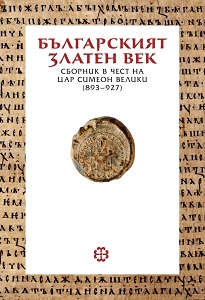
We kindly inform you that, as long as the subject affiliation of our 300.000+ articles is in progress, you might get unsufficient or no results on your third level or second level search. In this case, please broaden your search criteria.

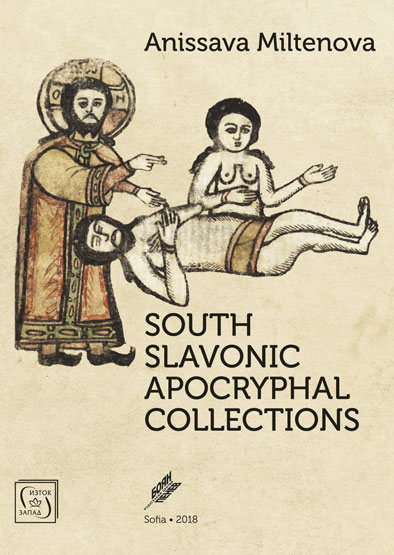
This book represents a study of the textology, typology, sources and literary peculiarities of the so-called ’miscellanies of mixed content' in the South Slavonic tradition (from the end of 13th – the beginning of 18th c.) – less known or unknown in the Humanities. The problem is closely related to the apocryphal collections in the Balkan Cyrillic manuscripts, as the Apocrypha are a significant part of this type of manuscripts. The scope of the study is to popularize the series and texts that fill the gap in the translation and perception of the Slavonic Apocrypha. New information is presented over the sources of translations, as well as the compilation approach of Slavonic writers, which reproduces a new version of the texts. The copies of the Slavonic texts are published in the supplement. The typology of manuscripts is supported by plectograms produced in the Repertory of Old Bulgarian Literature and Letters (http://repertorium.obdurodon.org/).
More...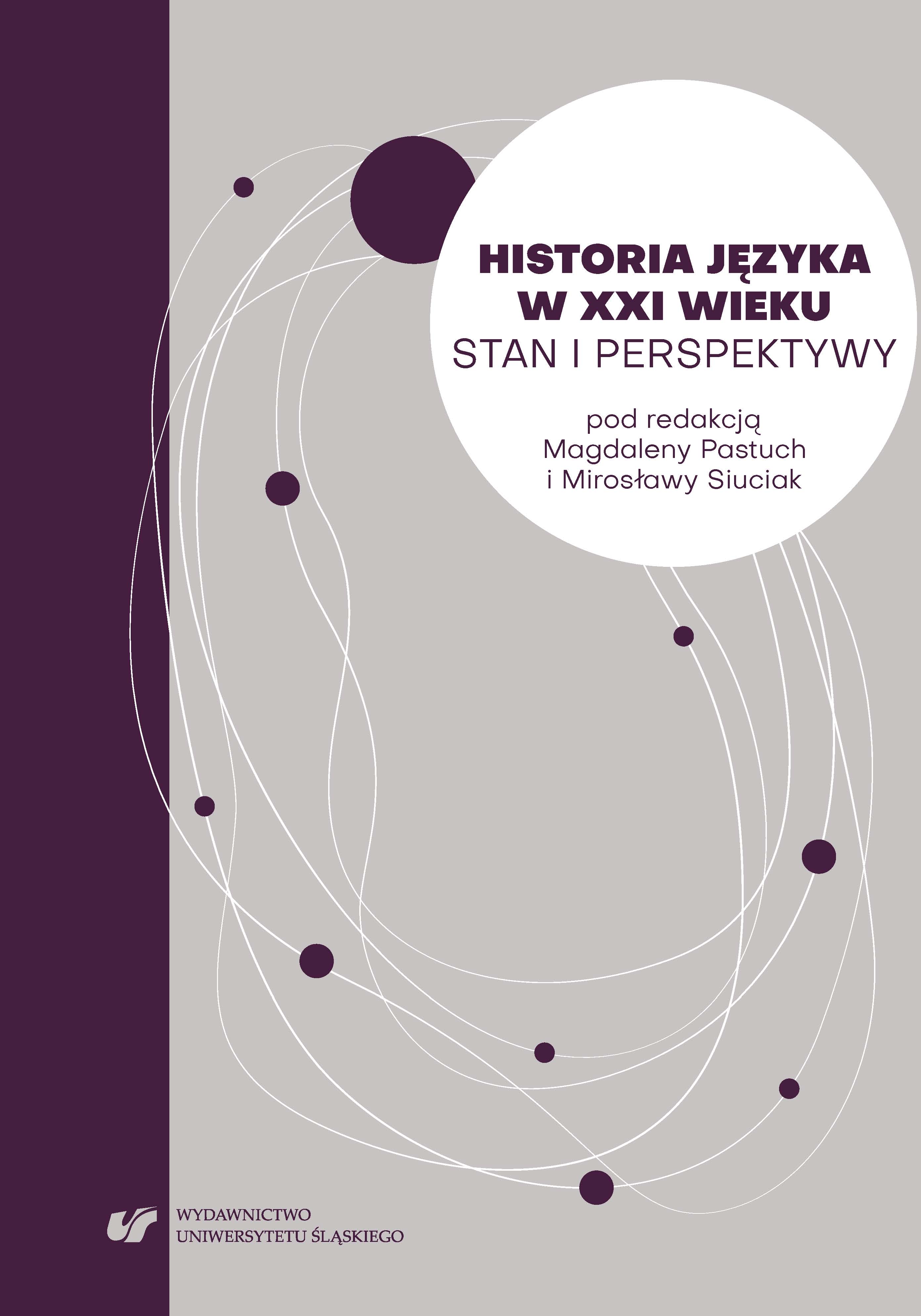
The paper presents some problems related to the interpretation of the linguistic facts characteristic of the Polish language of the 17th and 18th century Southern Borderland (illustrated by the example of phonetic features). Due to the complicated genesis of this language variety, it is sometimes difficult or even impossible to determine the nature and origin of some phenomena. Interpretative dilemmas arise in the case of such questions as: 1) does a phenomena in question have a merely graphic or also phonetic nature (e.g. forms such as Błogosławięstwy), 2) should a phenomena in question be considered a peripheral archaism or a result of Ukrainian interference (e.g. forms such as alie, pisarsz, oczekuiąć), 3) should a phenomena in question be considered one of Polish dialect features or Ukrainian borrowings (e.g. forms such as Łaskie, sztachietow, chiba) etc.
More...
The article presents perspectives adopted in research related to linguistics studies dedicated to Polish old catholic sermons, mainly preached in 19th century. First part of this paper presents characteristics of newer linguistic research carried on basis of sermons in 19th century in comparison to sermons preached prior to this period. In second part the author discusses the perspective of research that she have adopted during own research on sermons created and published in second half of 19th century. The author considers as the most crucial reference the concept of historical and linguistic, also communicative idea developed by Stanisław Borowski that has been associated with category of communicative community as well as its bonding and shaping communicative processes. Equally important to author’s research is generic perspective, which allows to describe meaning and function of religious statement genre, such as sermon, in order to realize communicative needs of religious communicative community. Direction of research within this area is based mainly on the concept of genres created by Maria Wojtak and Bożena Witosz, especially assumptions of historical genology. Another point of view, allowing to discover interesting possibilities of analysis, brings consideration of historical, cultural and social realities that accompanied creating and functioning of preaching texts. Last part presents sample lingual analysis of hell’s image, in which it is including delineated research perspectives. The paper discusses assortment criterion in analyzing preaching texts that are believed to guarantee representativeness of research material.
More...
The aim of this article is to identify the literature on political communication in Poland by the year 1795. The result of research on the legal notion variety of political communication are devoted to the development of lexis codes and statutes, the semantics of selected terms of political and constitutions and statutes. Linguists study the history and origins of the rhetorical style, the language of individual orators and the effectiveness of speech or politeness language.
More...
The paper investigates the interpretational challenges and research limitations faced by the historians of language who analyse the lexis of the scientific and technical texts of the Middle Polish period. It was established that such challenges stem from the following: 1) the necessity to have at hand specialised knowledge relating to natural sciences, which is rare among linguists; 2) the need to regard Middle Polish scientific from the perspective of past science, not the modern one; 3) lack of competence of the speakers of the centuries-old Polish; 4) the necessity to make use of lexicographical papers for research purposes; 5) incompleteness of written lexical historical material as preserved in old texts.
More...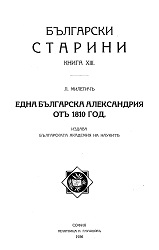
Published in 1936 by the Bulgarian Academy of Sciences (Department for History and Philology) as vol 13 of the series "Bulgarian Old Age" (БЪЛГАРСКИ СТАРИНИ, КНИГА XIII)
More...
This volume, Intellectuals and War, follows on the heels of last year’s publication of Another Serbia. Like the latter, it is the result of the work of the Belgrade Circle. As the reader will recall, Another Serbia is a collection of over eighty talks given by members of this association of independent intellectuals and their guests, during ten of the sessions of the Belgrade Circle held every Saturday from the beginning of April to the end of June 1992. Intellectuals and War brings together some fifty texts, which were presented as part of the series »Intellectuals and War« organized every other week, for ten sessions from the beginning of October 1992 until the end of February 1993. At a time when every call for peace, national tolerance, and liberal democracy was being confronted with scorn, disdain, and open ridicule; at a time, that is, when even the most cautious doubts about the utility of the war, which might deflate the state mythology were being denounced as acts of treason committed by slanderers of the National Idea, the Belgrade Circle organized the thematic series, »Another Serbia« and introduced itself to the domestic public as one of the truly rare associations (not to mention political parties, the few exceptions not withstanding) whose members refused on principle to contribute to the destruction of other nations and the demise of their own. With this series and, particularly, with the publication of our book by the same name, the expression »Another Serbia« became a motto for all those who sooner or later came to see the dangers of the nationalist policies of the past five or more years. Unfortunately, many of the dark forebodings expressed in that first series proved to be true. With tragedies mounting at an alarming rate, many words that then sounded very strong, sometimes even, strident, have become but mild reproaches today. Words that once, only a year ago, were just short of blasphemy, have long since become commonplace in the mildest critical discourse in which almost everyone engages. Yet, in looking through the pages of Another Serbia today, one issue emerges from a number of the contributed works that still has not permeated public consciousness deeply enough and has only with great difficulty found its way into the conscience of those individuals to whom it directly refers. This is, of course, the matter of the responsibility of intellectuals for spreading national intolerance, inflaming hatred, advocating war, and – eventually – for instigating crimes and barbaric destruction and causing the isolation, poverty, denigration and scorn which has since come our way. With this in mind, the Belgrade Circle, as an association of – to repeat – independent intellectuals, decided to organize its second thematic series of discussions around this sensitive and uncomfortable question, which is often protected by taboo. The Belgrade Circle did not act impetuously in calling for an open examination of the role of public-opinion makers in the Yugoslav tragedy. Nor did it do so only after having seen the tragic results of conspicuous blunders by writers, scholars, and religious figures in irresponsible national mythmaking or – worse – in open incitement to war. Such a decision was part of the original motivation guiding the future founders of the Circle. Long before the disintegration of the country and before borders were redrawn, territory occupied and people expelled from their homes, they witnessed a number of their colleagues working as free agents or, more often, as institutional propagandists, dutifully reviving national myths, recounting the victims of pats years as if infatuated with death, reworking the ideology of land and blood and skilfully explaining the need for the South Slavic peoples to »separate« from one another once and for all. Seeing this, it became clear to the future members of the Belgrade Circle that it would not be long before these words were turned into deeds. The common denominator for the some twenty philosophers, sociologists, scientists, artists, and journalists who joined together in the Belgrade Circle was, in fact, the decisive refusal to participate in such undignified activities, which could only end in the horrors of war. In its founding Act, and later in number of public statements and individual appearances by its members, the Circle pointed to the responsibility of the »national intelligentsia« and »national institutions« for war and condemned their abuse of public speech. Although against political trials as a matter of principle, the Belgrade Circle argued in its first public statement that not only should politicians, military leaders, and those directly involved in executing their policies be held accountable for their deeds, but also intellectuals responsible for inciting war and causing crimes against humanity, the destruction of cultural and historical treasures, massive displacement of populations and the exile of numerous distinguished creative figures, and the involuntary flight of educated young people. The fact that it was precisely those individuals who given the nature of their work, should have been among our ranks, but chose instead to put their talents, knowledge, and reputation in the service of legitimising a new collectivism, who were the first to poke fun at the Circle and attack it with angry, even threatening messages made it convincingly clear that this important initiative was directed to the right address. At the crucial moment when the class-based identity of society began to collapse from within, these intellectuals, rather then putting their strength and authority into the democratic enlightenment of an apathetic citizenry actively helped to enthrone another new unifying principle, a new unio mistica which would, this time, be based on an artificially awakened and stimulated national identity. Thanks largely to these efforts, the opportunity to become a society of free individuals who act as autonomous citizens in the political sphere and not as anonymous members of the one and only Class, on Nation was again – and, again for a long time – gambled away. Put simply and crudely: once again, »ideologues«, »clerics«, and »guard dogs« have sold us a bill of goods. Few or the participants in the series »Intellectuals and War« were prepared to say that all »national intellectuals« were guided by evil intentions, hatred toward other peoples, vicious greed, futile craving for fame and honour, or the desire to gain the favour of the new/old rulers. It was clear to our authors that there were honest and intelligent people among these »national intellectuals« who sincerely believed that after the fall of the »old regime« it was more important to resolve the national question than to work for the establishment of parliamentary democracy. Reality – as is most often the case – provided them with a real basis for dissatisfaction. However, just as the framers of the idea of the social revolution before them, they turned to the implementation of the national revolution, without paying attention to the means those contracted do to the job – nurtured as they were in our rich tradition – would more than likely use. Thus, it is hard to resist the conclusion that the war began in words. Any rational observer of the now distant events could reasonably have expected the abbreviated series of exchanges between abstract ideas and concrete acts to turn easily and rapidly into bullets. After all, doesn’t the saying go: the pen is mightier than the sword!? A majority of the authors contributing to this volume, share the belief that if intellectuals – who have since become peace advocates – are now amazed and horrified by the sea of spilled blood, the ruined cities and villages, the rivers of displaced and uprooted people, and the previously unimaginable faschisation, impoverishment, and criminalisation of society, they must – if nothing else – face up to their own professional and moral responsibility for this. But this is a question of individual conscience which no one may or should pas a judgment. Some of the text, however, express the belief that another kind of responsibility – one that presumes more tangible consequences than merely having to confront oneself – must surely fall on the shoulders of that »portrait gallery« of our intellectual guard who have consciously advocated war and misted the people, captivating them with otherworldly messages, promising them the heavenly city, submerging them into the past, offering them dignity through force, and turning them away from the most natural desire to live a better and happier life with Others rather than in isolation from the outside world, imprisoned by self-love. One moment openly, the next moment covertly, they supported the consolidation of an authoritarian and indifferent regime, which would carry out the dirty work for them and for the greater glory of the Nation. They graciously allowed the forces of evil to strike, always ready to put the intellectuals’ most daring plans into action. Sometimes participating directly in the government, but more frequently, acting in the shadows as advisors to the absolute ruler and his priests and in collusion with our Volksgeist, these intellectuals were not prepared to take a stand at those moments when the people appeared to have come to their senses. They introduced even greater discord into the already confused political scene as they entered into the ranks of political parties that had the appearance of becoming democratic. Through both their silence and action, they allowed the uneducated electoral body to surrender itself to the one and only real leader. With these texts in front of us, it is tempting to outline a series of »generic-types«, that is, to construct a certain number of »ideal types« from among our national intellectuals. It is easy to understand those readers who would be happy with a string of unique caricature-like portraits. We have merely to think about all those crazed painters, poets of hearth and home, ominous prophets, patented demystifyers of planetary conspiracies and experts in deconstructing the »new world order«, ethno geneticists and amateur historians who trace their nation’s roots to ancient, even prehistoric times, former Marxists who find solace for their collapsed ideology in the »sweet joy of belonging« to the Nation, indefatigable drafters of geopolitical maps, and journalists and columnists who have persistently presented our unsophisticated readers and television audiences with an up side down picture of history and the world. But for now, let’s just keep these in mind: as, in this brief introduction we cannot even hope to sketch out such a typology, much less, to take on a detailed study of some prominent cases. What we can do is hope that a future systematic examination of the role of intellectuals in the wars we are going through will enable us to arrive at an answer to the question posed by the authors of this volume. They themselves have not been motivated by the ambition to offer an answer now and this motivation could hardly be sad to be common denominator among the various texts, which differ both in genre and in the opinions they present. As in Another Serbia, the contributors to Intellectuals and War have their own views and are alone responsible for their words.
More...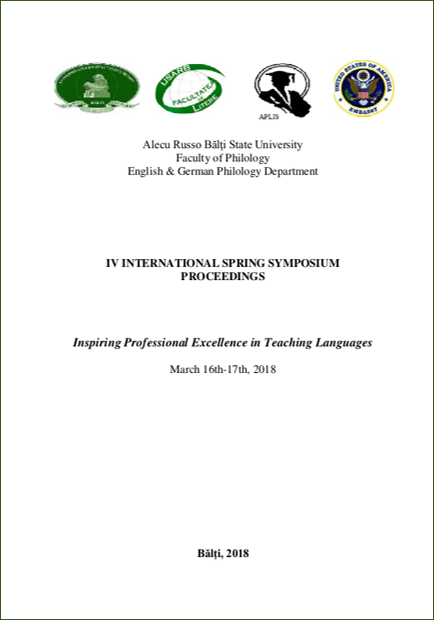
Rhetorics of Letters written to Ceausescu by Dorin Tudoran Letters written to Ceausescu by Dorin Tudoran represent a way to express the negative attitude towards the totalitarian communist system in Romania. The structure of the letters reveals the author’s unique style. The detected style is an argumentative one, where the logical open argument is always announced. The author uses the sentence to communicate with the reader. Thus, the sentence, in the greatest number of cases, is simple, although the inversion can often be observed too. The composite sentence is distinguished by its complexity. Still, the subordinate clauses are more often used than the coordinate ones. The letters are written in a combined style (administrative official style and the belletristic one) which generates an easy, expressive, and coherent exposure.
More...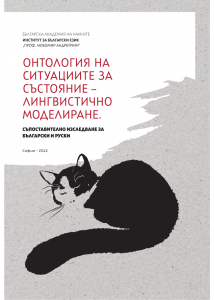
The preface to the book Ontology of stative situation – linguistic modeling. A contrastive Bulgarian-Russian study presents the main goals of a Bulgarian-Russian scientific project aiming at fundamental theoretical descriptions and its results: a theoretical account of the properties of stative predicates and predicative words on the basis of which an ontological representation of stative situations is proposed; a profound analysis of the semantic and syntactic structure of different types of stative predicates and predicative words in Bulgarian and Russian; contrastive studies manifesting similarities and differences in the semantic and syntactic representation of states in Bulgarian and Russian.
More...
I discuss the foundations of predicate ontologies as grounded in two model notions – elementary states of affairs and events or eventualities, i.e. ordered pairs of initial and end states of affairs. Vendlerian classifications are oriented towards elementary states and tense logic, while Davidsonian classifications deal with eventualities and event logic. Most existing approaches implement two taxonomic criteria: 1) a distinction between spatiotemporal and non-spatiotemporal (atemporal) predicates; 2) a distinction between dynamic and static predicates. There are two kinds of atemporal meanings – predication of facts and predication of properties. Facts are propositional arguments of second-order predicates which add a special meaning that the embedded proposition has been verified. Properties are atemporal first-order predicates that lack an eventive interpretation and are not associated with factive frames. Davidsonian states are homogeneous durable spatiotemporal entities distinct both from atemporal properties and spatiotemporal dynamic predicates. The homogeneity criterion differentiates Davidsonian states from telic dynamic predicates denoting a transition from phase p to phase ~ p. The durability criterion distinguishes Davidsonian states from accomplishments (i.e. resultatives) that are anchored to a single time point. Davidsonian states are conceptualized in natural language metaphysics as causally independent entities,while resultatives are causally determined as they reconstruct a preceding event that has caused the end state p. The demarcation line between Davidsonian states and homogeneous atelic processes depends on the chosen criteria for identification of active and inactive (inert)processes. It is usually assumed that Davidsonian states do not combine with active subjects.The subcategorization of Davidsonian states must be based on their quantification properties.I discuss the contrast between external and internal Davidsonian states. The former lack a priority argument and may be quantified extensionally based on their locus parameters, e.g.time and space. The latter have a priority experiential argument and can only be quantified intensionally. External states can be observed, while internal states cannot be observed and visualized. The stage-level-predicate (SLP) vs. individual-level predicate (ILP) distinction introduced by Carlson is equivalent to the one between Davidsonian states and properties in holistic predicate ontologies, but Carlson’s approach patterns with partial ontologies, i.e.the manifestation of categorial predicate types in diagnostic syntactic contexts. A similar approach has been developed by Shcherba, who claimed that <Davidsonian> states opposed to properties tend to form a word class consisting of non-agreeing non-verbal expressions in Modern RussianI discuss the foundations of predicate ontologies as grounded in two model notions – elementary states of affairs and events or eventualities, i.e. ordered pairs of initial and end states of affairs. Vendlerian classifications are oriented towards elementary states and tense logic, while Davidsonian classifications deal with eventualities and event logic. Most existing approaches implement two taxonomic criteria: 1) a distinction between spatiotemporal and non-spatiotemporal (atemporal) predicates; 2) a distinction between dynamic and static Предикаты состояния... 52 predicates. There are two kinds of atemporal meanings – predication of facts and predication of properties. Facts are propositional arguments of second-order predicates which add a special meaning that the embedded proposition has been verified. Properties are atemporal first-order predicates that lack an eventive interpretation and are not associated with factive frames. Davidsonian states are homogeneous durable spatiotemporal entities distinct both from atemporal properties and spatiotemporal dynamic predicates. The homogeneity criterion differentiates Davidsonian states from telic dynamic predicates denoting a transition from phase p to phase ~ p. The durability criterion distinguishes Davidsonian states from accomplishments (i.e. resultatives) that are anchored to a single time point. Davidsonian states are conceptualized in natural language metaphysics as causally independent entities, while resultatives are causally determined as they reconstruct a preceding event that has caused the end state p. The demarcation line between Davidsonian states and homogeneous atelic processes depends on the chosen criteria for identification of active and inactive (inert) processes. It is usually assumed that Davidsonian states do not combine with active subjects. The subcategorization of Davidsonian states must be based on their quantification properties. I discuss the contrast between external and internal Davidsonian states. The former lack a priority argument and may be quantified extensionally based on their locus parameters, e.g. time and space. The latter have a priority experiential argument and can only be quantified intensionally. External states can be observed, while internal states cannot be observed and visualized. The stage-level-predicate (SLP) vs. individual-level predicate (ILP) distinction introduced by Carlson is equivalent to the one between Davidsonian states and properties in holistic predicate ontologies, but Carlson’s approach patterns with partial ontologies, i.e. the manifestation of categorial predicate types in diagnostic syntactic contexts. A similar approach has been developed by Shcherba, who claimed that
More...
The study is focused on the semantic and conceptual description of stative verbs.We analyze stative verbs represented in WordNet and the corresponding frames in FrameNet after the alignment between the two resources. After presenting a classification of stative verbs into thematic classes, we outline the components of the conceptual description based on FrameNet frames, the relations between them and the frame elements that describe the frames. We attempt at building a hierarchical structure of frames for each thematic class and a shallow hierarchy of frame elements with a view to their representation and specialization from a more general (parent) frame to more specific (child) frames related to the general one by means of relations such as inheritance, weak inheritance or perspectivization.The study is focused on the semantic and conceptual description of stative verbs. We analyze stative verbs represented in WordNet and the corresponding frames in FrameNet after the alignment between the two resources. After presenting a classification of stative verbs into thematic classes, we outline the components of the conceptual description based on FrameNet frames, the relations between them and the frame elements that describe the frames. We attempt at building a hierarchical structure of frames for each thematic class and a shallow hierarchy of frame elements with a view to their representation and specialization from a more general (parent) frame to more specific (child) frames related to the general one by means of relations such as inheritance, weak inheritance or perspectivization.
More...
The paper deals with the diatheses, diathetic alternations and constructions characteristic of verbs of emotion in Russian. The focus of the study is on the limits of diathetic alternations and the groups of uses that fall beyond their scope, i.e. ones that cannot be transfromed into an alternative diathesis. In particular, I discuss the diversity of constructions with transitive verbs of emotion and an instrumental object, as well as the use of reflexive verbs of emotion to introduce direct speech. I also analyze the distribution of the uses of several basic verbs of emotion in texts in terms of the diathetic types and point out a number of verb-specific constructions.The paper deals with the diatheses, diathetic alternations and constructions characteristic of verbs of emotion in Russian. The focus of the study is on the limits of diathetic alternations and the groups of uses that fall beyond their scope, i.e. ones that cannot be transfromed into an alternative diathesis. In particular, I discuss the diversity of constructions with transitive verbs of emotion and an instrumental object, as well as the use of reflexive verbs of emotion to introduce direct speech. I also analyze the distribution of the uses of several basic verbs of emotion in texts in terms of the diathetic types and point out a number of verb-specific constructions.
More...
The article aims at the description and analysis of the argument structure of Russian mental predicates. The study focuses primarily on the syntactic properties of arguments and the interaction between their syntactic, semantic, and discourse properties. It turns out that the opposition of factive knowledge predicates vs. non-factive opinion predicates map onto their discourse characteristics (arguments of opinion verbs are normally less topical than arguments of knowledge verbs) and their syntactic features (arguments of knowledge verbs become antecedents of pronouns and conjuncts of coordinate constructions more easily). These observations lead us to conclude that factive predicates are closer to the bivalent verb prototype than non-factive ones.
More...
In this study we examine predicative constructions expressing State Semantics in Bulgarian and Russian. The observations, analyses and generalizations are made on the basis of a collection of predicative constructions describing states in Bulgarian a
More...
This paper examines Bulgarian colloquial constructions of the type illustrated in the example И твоята панама нещо ми синее! Дали наистина е така или е от снимката? (Your canvas, too, looks somewhat bluish to me! Is it really like that or is it just the picture?), where the dative pronominal clitic marks the so-called subject of opinion. To render this meaning, Russian employs epistemic verbs or other linguistic means indicating the subject of opinion, even in non-standard colloquial speech, e.g. И твоя панама что-то мне кажется синей. Это так действительно или только на фото? The study is focused primarily on dative-clitic constructions with sensory perception predicates, colour and taste predicates in particular, as classes representative of distant and contact perception. The goal is to determine the conditions under which the dative may be interpreted as the subject of opinion and what syntactic characteristics this interpretation correlates with. In addition, we describe nonstandard constructions where the dative pronoun denotes an entity that evaluates a state-of-affairs (evaluating subject). We show that corresponding constructions cannot be found even in non-standard colloquial Russian. The article is centered on written colloquial language constructions which demonstrate the emergence and active occasional use of language units and models potentially able to gain a foothold in the language. We assume that the models established in the standard language serve as a basis for the emergence of new formations such as the ones occurring in 426 online communication. The analyses of the different manifestations of the so-called subject of opinion and subject of evaluation are illustrated not only by Bulgarian examples, but also by their Russian translations, as well as by original examples from Russian online communication, which serve to reveal the semantic differences between the distinct functions of the dative constructions and to demonstrate the possible renditions of these constructions into Russian.
More...
This paper discusses the basic means of expressing desire in the Bulgarian language in comparison with Russian. The main focus is on the Bulgarian dispositional constructions, e.g. (Танцува ми се; не ми се прибира (I feel like dancing, I do not want to go home), which do not have a direct equivalent in Russian. The specific structure of the Bulgarian dispositional constructions is analyzed against the background of the lexical means of expressing desire: both by personal and by impersonal verbs. On the basis of evidence from parallel corpora, I show how the lack of exact correspondences between the two languages is overcome in translation. Another important task of the study is to reveal the semantic and grammatical differences between the Bulgarian dispositional constructions and the reflexive-dative Russian model (Мне (не) работается (I do not feel like working), which expresses a state of predisposition to an action. I demonstrate that the two constructions in focus, although similar at first glance, have significant grammatical and semantic differences. The analysis of parallel texts suggests that both constructions do not have a direct translation equivalent in the target language, and that the Russian model does not even have a regular translation correspondence.
More...
The article compares the distribution of complementation strategies in Bulgarian and Russian. In Russian, the opposition of finite complements (introduced primarily by что and чтобы) is opposed to infinitive complements. In the default case, the former do not mark co-reference, while the latter are used in contexts involving co-reference between the main and the embedded clause arguments, although this is not always the case. Bulgarian lacks infinitives, thus, it has no non-finite complement forms. However, the infinitive functions are, to a great degree, fulfilled by да-complements, as opposed to че-complements. The significant differences observed in the data are due to the presence of the finite verb in the complement clauses introduced by the complementizer да. As we demonstrate, the opposition between что / чтобы and the infinitive in Russian and the difference between че and да in Bulgarian have a lot in common, although only Russian infinitive clauses are non-finite in the strict sense. To demonstrate this, we examine the relation between various strategies of complementation, co-reference and tense, and show how different complement types exhibit non-standard types of syntactic control.
More...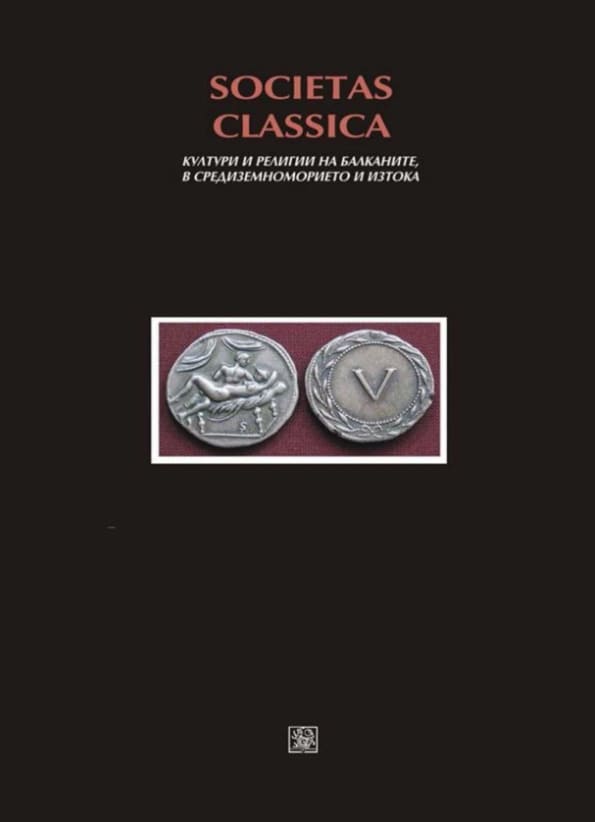
𝑆𝑜𝑐𝑖𝑒𝑡𝑎𝑠 𝐶𝑙𝑎𝑠𝑠𝑖𝑐𝑎 is a multilingual collection of papers presented at the international scientific conference that has been organized by the Department of Classical and Eastern Languages and Cultures of St. Cyril and St. Methodius University of Veliko Tarnovo (Bulgaria) since 2002. Until 2015, the conference was held annually. Since 2018, it is held once every two years. St Cyril and St Methodius University Press issues the collection within the Dr. Nicola Piccolo series. The wide range of topics and the opportunity for authors to submit their academic publications in the original language attracts researchers from all over the world.
More...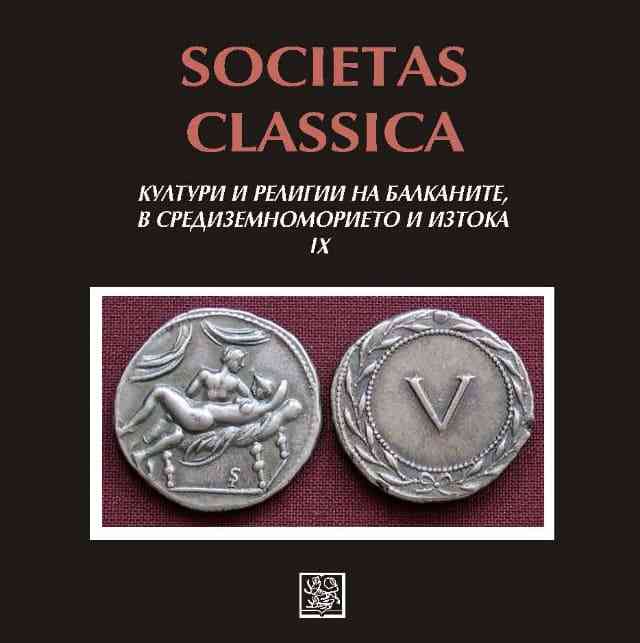
𝑆𝑜𝑐𝑖𝑒𝑡𝑎𝑠 𝐶𝑙𝑎𝑠𝑠𝑖𝑐𝑎 is a multilingual collection of papers presented at the international scientific conference that has been organized by the Department of Classical and Eastern Languages and Cultures of St. Cyril and St. Methodius University of Veliko Tarnovo (Bulgaria) since 2002. Until 2015, the conference was held annually. Since 2018, it is held once every two years. St Cyril and St Methodius University Press issues the collection within the Dr. Nicola Piccolo series. The wide range of topics and the opportunity for authors to submit their academic publications in the original language attracts researchers from all over the world.
More...